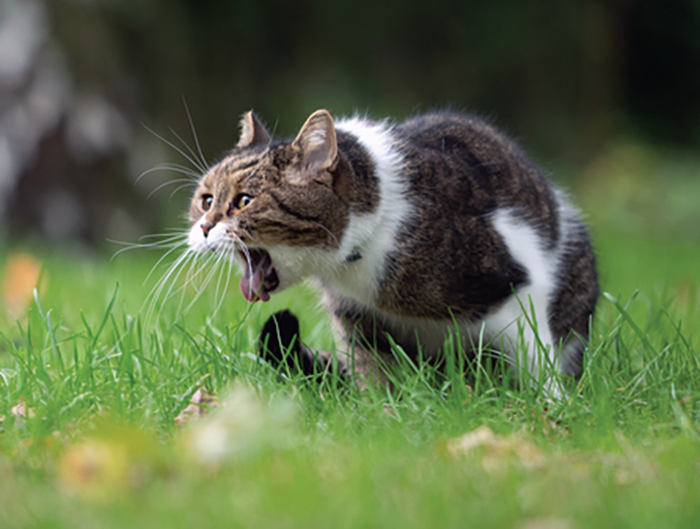Knowing what your cat has expelled from her stomach can give you clues as to whether it is a cause for concern. Hairballs are a routine part of being a cat, as is occasional vomiting due to minor stomach upset. But frequent hairballs can indicate a looming obstruction, and persistent vomiting can indicate a wide range of diseases and illnesses. It’s important that you identify what’s happening.
Identifying a Hairball
Hairballs, technically known as trichobezoars, are clumps of hair that form in your cat’s stomach due to normal grooming habits. Hair is mostly keratin, which can’t be digested. Some hair will travel through the digestive tract and come out in the stool, while some will remain in the stomach and gather into a ball. Sooner or later, this mass of hair irritates the stomach, and the cat vomits it up.
Hairballs are approximately the same color as your cat’s hair, but darker due to exposure to her food and gastric secretions. Despite being called a “ball,” they are usually more log-shaped than spherical after a trip through the esophagus. Hairballs can frequently be mistaken as poop at first but are not as stinky (see “Trichobezoar Means ‘Hairball,’” August 2020 at catwatchnewsletter.com).
Identifying Vomit
The appearance of vomit can vary widely depending on what is in your cat’s stomach at the time. If she ate recently, you may recognize her food or treats. If she has been snacking on cat grass or your houseplants, you will see plant material. For a cat with an empty stomach, the vomit may be primarily clearish liquid with yellow bile and/or some white foam.
Vomit can also be streaked with blood, which indicates an injury or irritation somewhere between the mouth and stomach.
Worry or Wait?
A hairball every week or two isn’t anything to be concerned about, and occasional isolated episodes of vomiting without other symptoms are likely due to minor stomach upset. If your cat is showing other signs of illness, however, she should be seen by your veterinarian.
Causes for concern include:
- repeated vomiting
- blood in vomit
- vomiting and diarrhea together
- frequent hairballs
- dry heaving
- lethargy
- poor appetite
- drooling
- distended abdomen
Vomiting is considered a nonspecific sign of a possible illness, meaning that it can occur with a wide range of illnesses and conditions. A cat experiencing frequent vomiting could be suffering from a systemic illness such as chronic kidney disease, may have eaten something that she shouldn’t have, or may potentially have a blockage in her gastrointestinal tract. Other potential causes of vomiting include cancer, food intolerance, internal parasites, hyperthyroidism . . . you get the idea.
Hairballs can become problematic if they get lodged somewhere in your cat’s digestive tract and cause an obstruction. Thankfully, these situations are rare.
Getting a Diagnosis
To get a handle on what is causing your cat to vomit or produce hairballs excessively, your cat needs a physical exam and blood work. Your veterinarian will palpate your cat’s abdomen to feel for obstructions, tumors, abdominal discomfort, and any other physical abnormalities. The blood work provides information on how internal organs are functioning.
Your veterinarian will need a detailed history from you on how often your cat pukes up nasty things on the floor, what the vomitus looks like, and if there are any patterns to when episodes occur (for example, if your cat routinely vomits after eating a meal or if she has an uptick in hairball frequency after stays at the boarding kennel).
All this basic information will help to direct your veterinarian to a potential cause for the issue and direct further diagnostics, which may include imaging such as abdominal radiographs and/or ultrasound.
In a Nutshell
Periodic hairballs once every week or two and isolated episodes of vomiting are not a cause for concern unless your cat is showing other signs of illness or discomfort. If your cat vomits repeatedly or is showing other symptoms, she should be seen by a veterinarian.
What You Can Do
If your cat is a frequent victim of hairballs and/or vomiting, keep track of when these episodes occur and any other symptoms. This can help you to determine if she requires veterinary attention and may be helpful to your veterinarian in determining the underlying cause.
Concurrent vomiting and diarrhea usually requires prompt care because cats can quickly become dehydrated in this situation.
Vomiting vs. Regurgitation
Vomiting is the active expulsion of stomach contents. Your cat’s abdomen will contract strongly, and it may be accompanied by some disgusting retching sounds.
Regurgitation is a mostly passive process during which food or fluid comes up from the esophagus. There is usually little preamble to regurgitation, no abdominal contractions, and your cat may be as surprised as you are.




